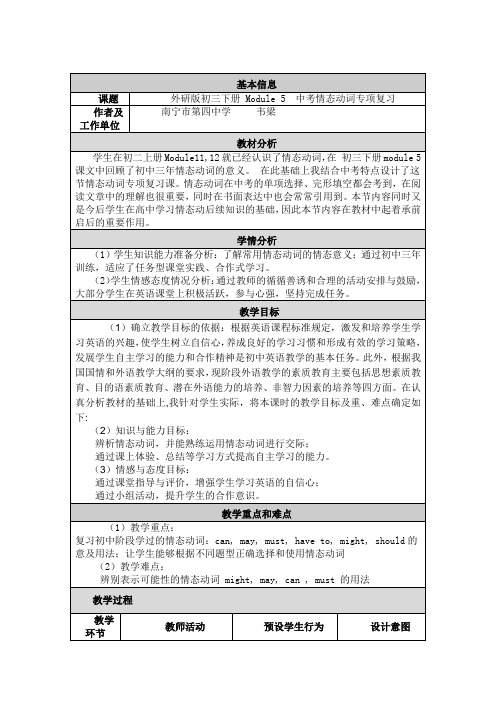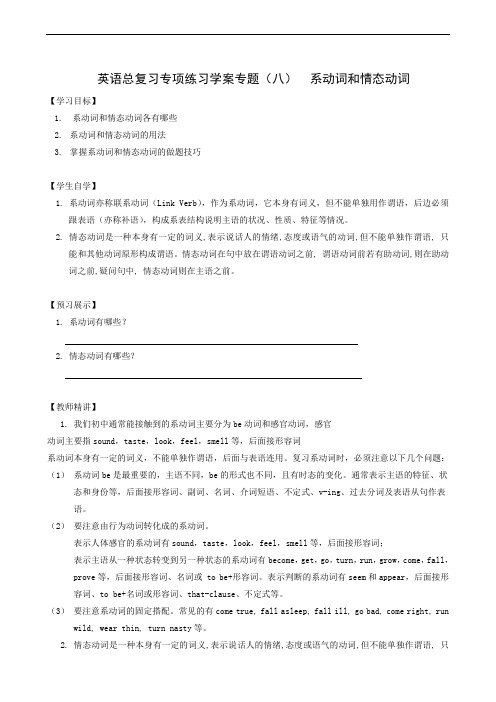英语:《情态动词》复习学案(外研版九年级下)
外研版九年级英语下册教案:Module 4 Unit 3

Module 4 Rules and suggestionsUnit 3 Language in use设计说明本单元是复习单元,首先从Language practice入手带着学生复习局部情态动词的用法,并通过对应的练习检测学生对本模块知识和语法的掌握情况;再结合课本上的听力和阅读练习巩固所学知识,同时教育学生遵守规那么;通过阅读有关生态旅游的文章,让学生知道哪些事情该做,哪些事情不该做,教育学生要保护自然,保护环境。
最后,让学生完成模块任务,讨论并给要来中国的游客写出建议,让学生到达学以致用的目标。
教学目标通过本单元的教学,让学生达成以下目标:1.知识目标(1)复习本模块新单词、短语及句型;(2)复习情态动词的用法。
2.能力目标(1)能够运用本模块所学知识完成此单元的习题;(2)能够给来中国的游客提出旅行建议。
3.情感目标通过谈论旅行规那么和建议,让学生知道哪些该做,哪些不该做,教育学生保护自然,保护环境,做一个遵纪守法的人。
重点难点重点:本模块的重点短语和句子难点:情态动词的用法教学准备PPT课件;活动6、7的录音授课时数4课时教学过程Step 1 Language practice Read the sentences in the box to the class.You must be careful of falling stones.You mustn't walk loo close to (he edge of (he hill path because you might fall and hurt yourselves. You should always wear proper clothes.1.Get the students to read the sentences and pay attention to the red body parts.2.Encourage the students to read the sentences aloud.Step 2 Grammar情态动词情态动词本身有一定的词义,表示说话人的情绪、态度或语气,但它们不能单独作谓语,只能和行为动词原形一起构成谓语,表示完整的意思。
情态动词复习教学设计

情态动词复习教学设计Teaching design of modal verb review情态动词复习教学设计前言:小泰温馨提醒,英语作为在许多国际组织或者会议上都是必需语言,几乎所有学校选择英语作为其主要或唯一的外语必修课。
英语教学涉及多种专业理论知识,包括语言学、第二语言习得、词汇学、句法学、文体学、语料库理论、认知心理学等内容。
本教案根据英语课程标准的要求和针对教学对象是高中生群体的特点,将教学诸要素有序安排,确定合适的教学方案的设想和计划、并以启迪发展学生智力为根本目的。
便于学习和使用,本文下载后内容可随意修改调整及打印。
1 情态动词的语法特征1)情态动词不能表示正在发生或已经发生的事情,只表示期待或估计某事的发生。
2)情态动词除ought 和have 外,后面只能接不带to 的不定式。
3)情态动词没有人称,数的变化,即情态动词第三人称单数不加-s。
4)情态动词没有非谓语形式,即没有不定式,分词,等形式。
2 比较can 和be able to1)can could 表示能力;可能(过去时用could),只用于现在式和过去式(could)。
be able to可以用于各种时态。
they will be able to tell you the news soon. 他很快就能告诉你消息了。
2)只用be able toa. 位于助动词后。
b. 情态动词后。
c. 表示过去某时刻动作时。
d. 用于句首表示条件。
e. 表示成功地做了某事时,只能用was/were able to,不能用could。
he was able to flee europe before the war broke out.= he managed to flee europe before the war broke out.注意:could不表示时态1)提出委婉的请求,(注意在回答中不可用could)。
--- could i have the television on?--- yes, you can. / no, you can't.2)在否定,疑问句中表示推测或怀疑。
中考情态动词专项复习教学设计

附件:中考情态动词专项复习学案一、考点归纳基础过关写出下列常见情态动词的基本含义和用法1.can/could _______ _______ _______ ________can’t/couldn’t_______ _______ _______ ________2.may/might _______ _______ may not ________3.must________ _________4.mustn’t__________5.needn’t___________6.have to__________ _________ don’t have to_______7.will/would_________ ________ _________8.shall __________ should_________ shouldn’t__________9. had better _______________10. --May / Can I use your cell phone ?的否定回答:--No,you___________. 或No, you____________.11. --Must I finish the work today?的否定回答:--No,you ____________.或No,you ______________.12. --Would you like some juice?肯定回答用______________.否定回答用______________.13. --Shall we go to Nanning No.4 high school?肯定回答用______________.否定回答用_____________.14.—Would you like to go to Nanning No.4 high school?肯定回答用______________.否定回答用_____________.二、真题训练中考实战1. --I hear you’ve got a new bike. ______ I have a look?(2012 苏州)--Yes, certainly.A. MayB. DoC. ShallD. Should2. --Honey , stay at home before I return.(2013 武汉)--I ________, Mum.A. mustB. canC. shouldD. will3. People _______ always be careful with fire, or it can be dangerous.A. canB. needn’tC. mustD. shouldn’t4. --Must we leave for Shanghai now?--No, we ___________. We still have two more hours.A. can’tB. mustn’tC. needn’tD. shouldn’t5.You _______ drive your car so fast. It’s very dangerous.(2013 安徽)A. wouldn’tB. shouldn’tC. couldn’tD. needn’t6. --Can I walk across the road now, mum?(2012 南通)--No, you ___________. You have to wait until the light turns green.A. couldn’tB. shouldn’tC. mustn’tD. needn’t7. --Is Maria knocking at the door? (2012 黄石)--It_________ be her. She is in Australia now.A. can’tB. mustC. mayD. mustn’t8. --Must I finish the homework this afternoon? (2013 钦州)--No,you needn’t . It _________ before Friday.A. can finishB.must finishedC. can be finishedD. must befinished9. --Would you like to see a film with me?--_________.A. yes, I like.B. yes, I would.C. Yes, I would like.D. Yes, I’d like to.10. --Could you please help me choose a camera online?--__________. My computer doesn’t work.A. I’m afraid I can’tB. I don’t careC. I hope soD. Certainly.11. Would you please__________the window? It’s so cold outside.A. openB. openingC. not openD. not to open12. We'd better ______out ,it's raining heavily outside.A.goB.to goC.not goD.not to go三、情景实践能力提升针对下列三种情景,提出你的合理建议。
外研版九年级英语下册知识讲义-情态动词(附练习及答案)

学习目标1. 情态动词的概念;2. 情态动词的用法。
情态动词的用法辨析。
情态动词是中考考查的一个重要知识点,主要考查情态动词表推测和其基本用法。
可能在单选、完形填空、词汇运用等题型中出现。
知识梳理You must be careful of falling stones.你必须要小心落下的石头。
You mustn’t walk too close to the edge of the hill path, because you might fall an d hurt yourselves.你们不能够靠山道边太近,因为你们可能跌倒,而让自己受伤。
You should always wear proper clothes.你应该穿着适宜的服装。
情态动词是一种本身有一定的词义,表示说话人的情绪,态度或语气的动词,但不能单独作谓语,只能和其他动词原形构成谓语。
1. —Do you have any plans for this weekend?—I’m not sure. I ______________ go climbing Mount Tai.A. mustB. needC. mayD. have to答案:C思路分析:考查情态动词辨析。
句意为:“—这个周末你有什么打算?”“—我不知道。
我______去攀登泰山。
”选项A必须;选项B需要;选项C也许;选项D不得不。
根据语境,我也许登泰山,所以选择答案C。
2. —Must I do my homework now?—No, you _____________. You may have a rest.A. mustn’tB. needn’tC. can’tD. wouldn’t答案:B思路分析:考查情态动词。
题干意思:—我必须现在做作业吗?—不,你不必。
你可以休息一会儿。
情态动词“不必”用needn’t,而mustn’t意为“千万不要,禁止”。
故选B。
外研版中考英语语法复习专题--情态动词教案

(二)情态动词的种类:(见下表)
原形
过去式
词义
can
could
能
may
might
可以(或许)
must
must(had to)
必须(不得不)
will
would
愿意
shall
should
应该
(三)情态动词的否定形式:
cannot --- can’tcould not --- couldn’tmay not--- mayn’t
(考点1,情态动词的本身含义表格中常考的情态动词均有现在和过去,用法:1、表过去式,用于疑问句中,语气比较委婉)
(四)常用情态动词的用法:(考点2情态动词的常规考法和特殊考法)
1.can与could
1).can
(1)表示体力或脑力方面的“能力”,也能表示根据客观条件能做某事的“能力”。
He can drive.
(1)can的过去式,表示过去有能力及过去的可能性。
He couldn’t climb up the mountain.
The news could be true.
(2)表示客气地请求或委婉地陈述意见。
Could you go skating with me tomorrow?
I’m afraid I couldn’t give you an answer tonight.
2) need引导的疑问句,肯定回答时多用must,否定回答时用needn’t。
Need he come? Yes, he must.No, he needn’t.
3) need后接名词做宾语时,表示“需要”某件事物,此时用作实义动词,与一般的实义动词用法完全一样,有时态和数的变化。如:
导学稿九年级复习情态动词、虚拟语气、冠词

九年级英语专项复习导学稿()课题:情态动词、虚拟语气、冠词课型:复习课时间:2011.4主备人:李亚学科审核人:王宁班级:姓名:一、学习目标复习情态动词、虚拟语气和冠词学习重点、难点情态动词、虚拟语气和冠词的使用二、复习导航(一)写出下列情态动词1.能,会_________否定式____ _____2.可以,也许__ _____否定式____ __3.必须,一定___ _____否定式____ _4. 需要___ _____5.应该____ _____(二)填空if引导的三种常见的句子:a.虚拟语气,表示与现在的事实不符,if从句用_ __,另一个主句用___;b.真实的条件句:表示一种假设,有可能会实现,if从句用__,主句用________;c.解释为是否的时候,看描述的事情有没有发生,没有发生的,可以用____三、学习过程(一)情态动词的选择题()1. —Must I hand in my composition today?—No, you ______. You may give it to me tomorrow.A. needn’tB. can’tC. mustn’tD. shouldn’t()2. —______you come to my birthday party tomorrow,Robert?—I’m afraid not.I have to study for my exam.A.MustB.ShouldC.CanD.Need()3. —you help me? I can’t find my keys.—Yes. It’s a pleasure.A.CanB.MustC.NeedD.Should()4. — Is Simon coming by train? — He should, but he _______ not. He likes driving his car.A. mayB. shallC. needD. must()5. —Jill looks so painful,there ____be something wrong with her.—Oh, dear!We’d better take her to the nearest hospital at once.A.canB. shouldC. wouldD. must()6. —May I watch TV? —Certainly. But you _____ finish your homework first.A. mayB. mustC. can’tD. needn’t()7. — Could I go to the movie this weekend, Dad?—Yes, you______. But you have to come back before nine.A. shallB. mustC. needD. can()8. This toy bear be Jane’s. She’s the only kid at the picnic.A. mustB. canC. needD. have to()9. —May I smoke here? —No, you ______only do that in the smoking room.A. needB. canC. mustn’tD. couldn’t()10. —Hello!____I speak to Mr Smith,please?A.Must.B.MayC.WouldD.Need(二)虚拟语气l.What would you do if you (make) a lot of money ?2.If I ( be ) you,l'd give him a pen as a present.3.I ( will ) go to the USA without money if I could fly.4.It is ( snow ) tomorrow ,the students will play basketball in the gym.5.I don't know if he (come) back.If he (come),please tell me.6.一My parents ask me to live in Shanghai.一If I you,I stay with them.(三)冠词()1. Maths is ___ useful subject. You can’t drop it , I think.A. anB. aC. theD. /()2. ____ bad weather it is!A. HowB. What aC. How aD. What()3. Mr. Li is ____ old worker.A. anB. aC. someD. /()4. One morning he found ____ handbag. There was ___ “s” on the corner of ___ handbag.A. a ; an ; theB. a ; a ; theC. a ; a ; aD. the ; an ; a()5. .Meimei is ___ best student in her class.A. aB. anC. /D. the()6. Is ___ book on the desk mine? Yes.A. theB. aC. anD. /()7. Smith is ____ honest man.A. aB. theC. anD. /()8. Mary is ___ cleverer of the two girls.A. theB. aC. anD. much()9.____ young must look after ___ old.A. The ; aB. The ; theC. A ; aD. A ; the()10. Kate sometimes plays ___ violin and sometimes plays ___ table tennis before supper.A. / ; theB. the ; /C. the ; theD. / ; /四、课堂检测:见全效五、教学反思 1.我的收获____________________2.我的疑惑____________________。
英语学案 全国通用九年级下册同步学习专题(8)系动词和情态动词

英语总复习专项练习学案专题(八)系动词和情态动词【学习目标】1. 系动词和情态动词各有哪些2.系动词和情态动词的用法3.掌握系动词和情态动词的做题技巧【学生自学】1. 系动词亦称联系动词(Link Verb),作为系动词,它本身有词义,但不能单独用作谓语,后边必须跟表语(亦称补语),构成系表结构说明主语的状况、性质、特征等情况。
2. 情态动词是一种本身有一定的词义,表示说话人的情绪,态度或语气的动词,但不能单独作谓语, 只能和其他动词原形构成谓语。
情态动词在句中放在谓语动词之前, 谓语动词前若有助动词,则在助动词之前,疑问句中, 情态动词则在主语之前。
【预习展示】1. 系动词有哪些?2. 情态动词有哪些?【教师精讲】1. 我们初中通常能接触到的系动词主要分为be动词和感官动词,感官动词主要指sound,taste,look,feel,smell等,后面接形容词系动词本身有一定的词义,不能单独作谓语,后面与表语连用。
复习系动词时,必须注意以下几个问题:(1)系动词be是最重要的,主语不同,be的形式也不同,且有时态的变化。
通常表示主语的特征、状态和身份等,后面接形容词、副词、名词、介词短语、不定式、v-ing、过去分词及表语从句作表语。
(2)要注意由行为动词转化成的系动词。
表示人体感官的系动词有sound,taste,look,feel,smell等,后面接形容词;表示主语从一种状态转变到另一种状态的系动词有become,get,go,turn,run,grow,come,fall,prove等,后面接形容词、名词或 to be+形容词。
表示判断的系动词有seem和appear,后面接形容词、to be+名词或形容词、that-clause、不定式等。
(3)要注意系动词的固定搭配。
常见的有come true, fall asleep, fall ill, go bad, come right, run wild, wear thin, turn nasty等。
中考英语 情态动词复习教案(表格式)

中考英语情态动词复习教案(表格式)一、教学目标:1. 掌握常见的情态动词,包括can, may, must, could, might, shall, will等。
2. 学会区分情态动词的用法,如表能力、可能性、建议、命令等。
3. 能够正确运用情态动词构造句子,表达推测、请求、承诺等意义。
二、教学重难点:1. 情态动词的辨析及用法。
2. 情态动词在特定语境中的运用。
三、教学方法:1. 任务型教学法:通过完成各种任务,让学生在实际运用中掌握情态动词的用法。
2. 互动式教学法:引导学生进行小组讨论、pr work等,提高学生的参与度和积极性。
四、教学准备:1. PPT课件:情态动词表格式教案。
2. 练习题:针对不同情境的填空、选择、改写等练习。
五、教学过程:1. 导入:以一段对话或故事引入情态动词,激发学生的兴趣。
2. 呈现:通过PPT展示情态动词表格式教案,引导学生观察和思考。
3. 讲解:讲解每个情态动词的用法,举例说明。
4. 练习:让学生完成PPT上的练习题,巩固所学知识。
5. 小组讨论:学生分组,讨论如何运用情态动词描述certn situations。
6. 分享:每组选代表分享讨论成果,大家互相评价、学习。
7. 总结:教师对情态动词的用法进行归纳总结。
8. 作业布置:布置针对性的练习题,让学生课后巩固。
9. 课后反馈:收集学生的作业,及时给予反馈和指导。
10. 课程拓展:引导学生关注情态动词在实际生活中的应用,提高语言运用能力。
六、教学评价:1. 课堂参与度:观察学生在课堂上的发言和互动情况,评估他们的积极参与程度。
2. 练习完成情况:检查学生完成的练习题,评估他们对情态动词用法的掌握程度。
3. 小组讨论:评估学生在小组讨论中的表现,包括他们的合作能力和语言表达能力。
七、教学拓展:1. 举办情态动词角色扮演活动:让学生在具体情境中运用情态动词,提高他们的实际运用能力。
2. 观看相关视频或阅读文章:通过视频或文章,让学生进一步了解情态动词在实际语境中的运用。
- 1、下载文档前请自行甄别文档内容的完整性,平台不提供额外的编辑、内容补充、找答案等附加服务。
- 2、"仅部分预览"的文档,不可在线预览部分如存在完整性等问题,可反馈申请退款(可完整预览的文档不适用该条件!)。
- 3、如文档侵犯您的权益,请联系客服反馈,我们会尽快为您处理(人工客服工作时间:9:00-18:30)。
九年级教学案
第周第节主备人 wangnianru 年月日课题M5u3 语法复习情态动词课型复习课
教学
目标
归纳语法情态动词巩固练习情态动词
重点巩固练习情态动词
难点归纳语法情态动词
教学
环节
教学内容措施矫正激情
导入
抢答造句
自主预习⌒指导、尝试、交流︶情态动词
情态动词有can (could), may (might), must, have to, shall (should, will (would), dare (dared), need (needed), ought to 等。
情态动词无人称和数的变化;不能单独使用,必须与其后的动词原形构成谓语。
1. can, could
1) 表示能力(体力、知识、技能)。
例如:Can you lift this heavy box?(体力) Mary can speak three languages.(知识) Can you skate?(技能)此时可用be able to代替。
Can只有一般现在时和一般过去式;而be able to则有更多的时态。
例如:I’ll not be able to come this afternoon. (一般将来时)当表示“经过努力才得以做成功某事”时应用be able to,不能用Can。
如: He was able to go to the party yesterday evening in spite of the heavy rain.
2) 表示请求和允许。
例如:-----Can I go now? ---Yes, you can. / No, you can’t. 此时可与may互换。
在疑问句中还可用could, might代替,但could, might 并不表示过去式,只是语气更委婉。
它们不能用于肯定句和答语中。
例如:--- Could I come to see you tomorrow? -- Yes, you can.
交流展示⌒任务、讨论、展示︶2. may, might
1) 表示请求和允许。
might比 may语气更委婉,而不是过去式。
否定回答时可用can’t 或mustn’t,表示“不可以,禁止”。
例如:----Might/ May I smoke in this room? --- No, you mustn’t. ---- May/Might I take this book out of the room?
--- Yes, you can. (No, you can’t / mustn’t. ) 用May I...?征徇对方许可时比较正式和客气,而用Can I...?在口语中更常见。
2)用于祈使句,表示祝愿。
例如:May you succeed!
3) 表示推测、可能性(不用于疑问句)。
might不是过去式,它所
表示的可能性比may小。
例如:He may /might be very busy now. Your mother may /might not know the truth.
3. must, have to
1) 表示必须、必要。
例如: You must come in time.
在回答引出的问句时,如果是否定的,不能用mustn’t(禁止,不准),而用needn’t, don’t have to(不必)。
例如: -- Must we hand in our exercise books today? --- Yes, you must. --- No, you don’t have to / you needn’t.
2) must是说话人的主观看法,而have to则强调客观需要。
Must
只有一般现在时,have to 有更多的时态形式。
例如:His play isn’t interesting, I really must go now. I had to work when I was your age.
3) 表示推测、可能性(只用于肯定的陈述句)例如:You’re Tom’s good friend, so you must know what he likes best.
Your mother must be waiting for you now.
4. dare, need
1) dare作情态动词用时, 常用于疑问句、否定句和条件从句中, 过去式形式为dared。
例如: How dare you say I’m unfair?
2) need 作情态动词用时, 常用于疑问句、否定句。
在肯定句中一
般用must, have to, ought to, should代替。
例如:You needn’t come so early. ---- Need I finish the work today? --- Yes, you must. / No, you needn’t.
3) dare和 need作实义动词用时,有人称、时态和数的变化。
在
肯定句中,dare后面常接带to的不定式。
在疑问句和否定句中,dare
后面可接带to或不带to的不定式。
而need后面只能接带to的不
定式。
例如:I dare to swim across this river. He doesn’t dare (to)
answer.
5. shall, should
1) shall 用于第一人称,征求对方的意见。
例如:What shall we
do this evening? 2) shall 用于第二、三人称,表示说话人给对
方的命令、警告、允诺或威胁。
You shall fail if you don’t work
hard. (警告) He shall have the book when I finish it.(允诺)
He shall be punished.(威胁)
教学
教学内容措施矫正环节
交流展示⌒任务、讨论、展示︶6. will, would
1) 表示请求、建议等,would更委婉。
例如: Will / Would you pa ss me the ball, please?
2) 表示意志、愿望和决心。
例如: I will never do that again. They asked him if he would go abroad.
3) would表示过去反复发生的动作或某种倾向。
would表示过去习
惯时比used to正式,且没有“现已无此习惯”的含义。
例如: During the vacation, he would visit me every other day. The wound would not heal.
7. sho uld, ought to
1) should, ought to表示“应该”,ought to表示义务或责任,
比s hould语气重。
I should help her because she is in trouble. You ought to take care of the baby.
2) 表示劝告、建议和命令。
should, ought to可通用,但在疑问句
中常用should。
You should / ought to go to class right away.
Should I open the window?
3) 表示推测
should , ought to (客观推测), must(主观推测)。
He must be home by now. (断定他已到家)
He ought to/should be hom e by now.(不太肯定)
This is where the oil must be. (直爽)
This is where the oil ought to/should be. (含蓄)
一,选用can, could, may, must, shall, should, will, would, can’t, mustn’t, needn’t或have to
1. There is air around us, thought we ________ see it.
2. Your mother is getting better and better. You _______ worry about her.
3. You _______ play football in the busy street.
感悟反思:。
